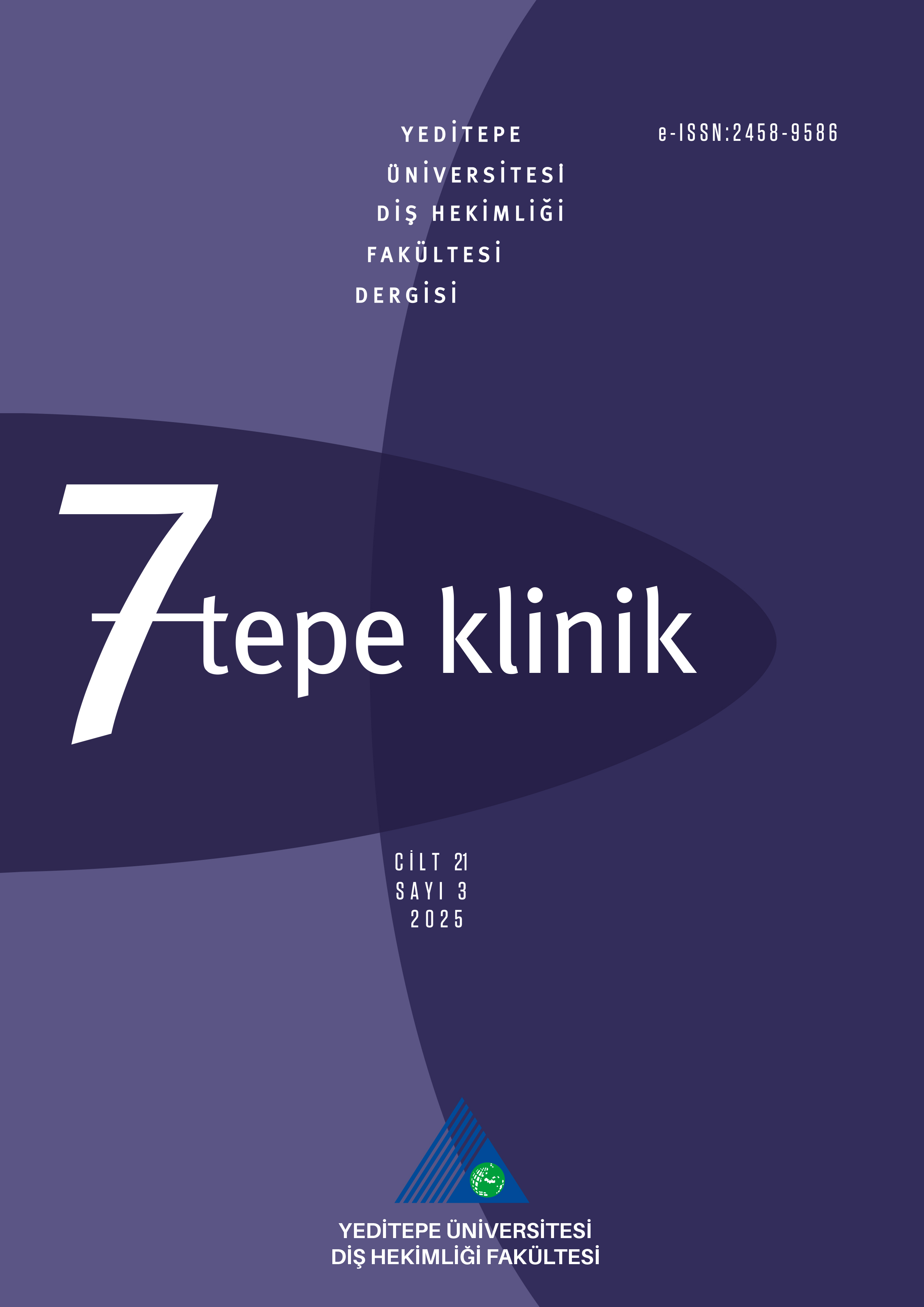Sinterizasyon prosedürünün monolitik zirkonyanın optik özelliklerine ve dayanımına etkisi
Haydar Albayrak, Ravza EraslanErciyes Üniversitesi, Diş Hekimliği Fakültesi, Protetik Diş Tedavisi A.D., KayseriGİRİŞ ve AMAÇ: Farklı sinterizasyon prosedürlerinin farklı kalınlıklardaki monolitik zirkonun (MZ) optik özelliklerine etkisini inceleyen çalışmalar sınırlıdır. Bu çalışmanın amacı sinterizasyon prosedürü ve kalınlığın MZnin translusensi, opalesans ve biaksiyel kırma dayanımına (BKD) etkisini değerlendirmektir.
YÖNTEM ve GEREÇLER: Disk şeklinde 40 adet örnek presinterize zirkonya bloktan kazınmış ve kalınlıklarına göre (0,6 ve 1,2 mm) iki gruba (n=20) ayrılmıştır. Her bir gruptaki numuneler standart (S) ve hızlı (H) prosedürlere göre sinterize edilerek alt gruplara (n=10) ayrılmıştır: Standart 0,6mm, standart 1,2mm, hızlı 0,6mm, hızlı 1,2mm. Ardından her bir numunenin kontrast oranı (KO) ve opalesans parametresi (OP) hesaplandı. Optik özelliklere ait veriler 2-yönlü varyans analiziyle (α=0,05), BKD verileri aynı kalınlık grubu içerisinde bağımsız örneklerde t testleri ile karşılaştırıldı (α=0,05).
BULGULAR: KO ve OP üzerinde kalınlığın ve sinterizasyonun etkisi istatistiksel olarak anlamlıdır (p<0,001). Grup-1,2nin KO (0,72±0,1; p<0,001) ve OP (3,28±0,16; p<0,001) değerleri grup- 0,6ya (KO=0,62±0,02; OP=3,06±0,2) göre istatistiksel olarak anlamlı derecede yüksektir. Hızlı sinterize edilmiş tüm örneklerin KO (0,66±0,06; p<0,001) ve OP (3,12±0,25; p<0,05)si standart sinterize edilmiş tüm örneklere (KO=0,68±0,05; OP=3,22±0,13) göre istatistiksel olarak anlamlı derecede düşüktür. Grup S-1,2 ile H-1,2nin BKD değerleri arasında istatistiksel olarak anlamlı bir fark yoktur (p=0,309).
TARTIŞMA ve SONUÇ: Bu çalışmanın sınırları içerisinde, kalınlığın translüsensi üzerindeki etkisi çıplak gözle algılanabilirken, sinterizasyon prosedürünün ektisi algılanamaz. 0,6 mmlik kalınlıkta hazırlanan MZ restorasyonların standart prosedürle sinterlenmesi önerilir.
Anahtar Kelimeler: biaksiyel kırma dayanımı, hızlı sinterleme, opalesans, translusensi
Effect of sintering procedure on optical properties and strength of monolithic zirconia
Haydar Albayrak, Ravza EraslanErciyes University Faculty of Dentistry, Department of Prosthodontics, KayseriINTRODUCTION: Studies that researched the effect of different sintering procedures on the optical properties of monolithic zirconia( MZ) with different thicknesses are limited. The purpose of this in vitro study was to investigate the effects of sintering procedure and thickness on the translucency, opalescence and biaxial flexural strength (BFS) of MZ.
METHODS: Forty disc-shaped MZ specimens were milled with presinterized-zirconia blank and divided into (n=20) two groups according to thicknesses (0.6 and 1.2mm). Each groups was sintered according to two different (standard [S] and fast [F]) sintering procedures then divided into two subgroups (n=10): Standart 0.6 mm, standart 1.2 mm, fast 0.6 mm, fast 1,2 mm. After that, contrast ratio (CR) and opalescence parameter (OP) were calculated. Data of optical parameters were analyzed with two-way analysis of variances (α=.05). The data of strength were analyzed by independent sample t-tests within the same thickness groups (α=.05).
RESULTS: The effect of thickness and sintering on CR and OP was statistically significant (p<.001). CR (0.72±0.1; p<.001) and OP (3.28±0.16; p<.001) values of group-1.2 were statistically significantly higher than group-0.6 (CR=0.62±0.02; OP=3.06±0.2). CR (0.66±0.06; p<.001) and OP (3.12±0.25; p<.05) values of all fast sintered samples were statistically significantly lower than all standard sintered samples (CR=0.68±0.05; OP=3.22±0.13). There was no statistically significant difference between BFS values of Group S-1.2 and F-1.2 (p=.309).
DISCUSSION AND CONCLUSION: The effect of the thickness on the translucency is perceivable by the naked-eye, while the effect of the sintering procedure is not. It is recommended to MZ restorations with 0.6 mm are sintered by standard procedure.
Keywords: biaxial flexural strength, fast sintering, opalescence, translucency
Makale Dili: Türkçe



